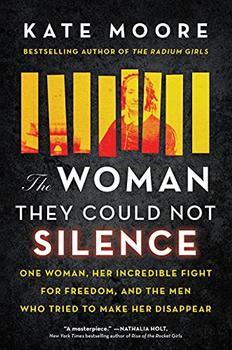Book Club Discussion Questions
In a book club? Subscribe to our Book Club Newsletter and get our best book club books of 2025!
For supplemental discussion material see our Beyond the Book article, English and American Coverture Law and our BookBrowse Review of The Woman They Could Not Silence.
Please be aware that this discussion guide will contain spoilers!
- Elizabeth is locked up in the asylum because her husband does not agree with her religious views. Do you think modern-day America is more or less tolerant of diverse religions (and controversial viewpoints) than in Packard's time? How free are followers of minority faiths to practice in the US today?
- Elizabeth employs a variety of tactics—physical resistance, negotiating with hospital staff, writing—to protest her treatment throughout the book. Which techniques were most effective for her? What strategies would you turn to in her place?
- "Novel reading," masturbation, and irregular menstrual cycles are a few of the many reasons that women were admitted to asylums in Elizabeth's time. Which, if any, of these justifications stood out to you? How has our understanding of these "causes of insanity" changed?
- Dr. Duncanson, the doctor who supports Elizabeth in her insanity trial, testifies that: "I did not agree with... her on many things, but I do not call people insane because they differ with me." How relevant is this statement in America today when political opinions are so divided, and what does it do to public discourse when the idea of insanity is brought into politics? Do you think we might ever return to a time when people are locked up for holding an opposing viewpoint to those in power?
- Elizabeth and McFarland have a complicated relationship to say the least. What did you think of her continuous attempts to redeem him? Did she truly think he would change, or was she just trying to improve her own circumstances? What were the long-lasting effects of the relationship on each of them?
- When Elizabeth is first released from the asylum, how does her homecoming compare to her daydreams and expectations? Have you ever had a similar experience? How did you handle the difference between your expectations and reality?
- Elizabeth's landmark case for her sanity was originally a trial regarding habeas corpus. What did you think of the judge's decision to shift focus? Is a jury qualified to confirm or deny someone's sanity?
- What did you think of the spate of releases that occurred right before Jacksonville came under scrutiny?
- Right or wrong, McFarland was completely trusted by the Jacksonville Asylum's Board of Trustees. What impact did this have on his patients? How did the Board respond to Fuller's investigation and recommendations? Can you think of a way to avoid such conflicts of interest?
- Governor Oglesby was not required to act on the findings of the investigative committee and planned to keep them under wraps until the next meeting of the Illinois General Assembly. What motivated him to keep the report under wraps? Do you think modern politicians play the same games with important information?
- The book explores the power of rumor and reputation. Even though Elizabeth is declared sane, rumors persist about her sanity for the rest of her life and were used to discredit her. Can you think of any modern-day examples where, even though someone has been cleared of something, their opponents continue to use that something against them? Do you think this is "fair game," or is it morally wrong?
- How did Elizabeth's status as a woman, mother, and asylum patient both help and hinder her lobbying efforts? How did she use men's expectations of her to bolster her causes?
- Which of Elizabeth's many accomplishments do you think she was most proud of? Is there anything else you see as her greatest achievement?
- Elizabeth writes: "To be lost to reason is a greater misfortune than to be lost to virtue, and the... scorn which the world attaches to it [is] greater." Do you think this is still true today? The American Psychological Association recently stated that only twenty-five percent of adults with symptoms of mental illness believe that people will be caring and sympathetic toward them. How can we improve sympathy for those who struggle with their mental health? And which do you think carries more societal shame: having a mental health problem or being "lost to virtue"? Is the answer dependent on gender?
Unless otherwise stated, this discussion guide is reprinted with the permission of Sourcebooks.
Any page references refer to a USA edition of the book, usually the trade paperback version, and may vary in other editions.
